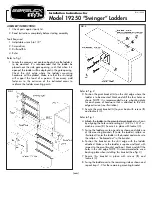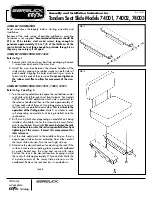
Theory of Operation
Chapter 3: Theory of Operation
TranStar® PC-100/PC-200/PC-300/PC-350/PC-400/PC-450/
Page 3 - 7
PC-500/PC-550/TR-500/SG-500/OB-450/OB-550/EL-550
Series Stretcher Service Manual (man115re)
3
Input Circuit
The transient voltage suppressors, CR8, CR10 - CR13, protect the logic from
overvoltage conditions.
The input resistors, R4 - R7, R9, serve two purposes. They act as current
limiting resistors for the associated CMOS logic gates, and with capacitors, C6
- C10, create a delay to filter out any switch bounce.
The delay created by the resistors and capacitors along with the diodes, CR6,
CR7, CR14, CR17, CR18, and circuit logic prevent rapid switching from an up
function to a down function. This protects the switching components in the
motor drive circuitry.
Logic
The CMOS logic gates are configured to obtain the desired functionality of the
stretcher.
Schmitt NAND gates are used at any point where there is a slow rising input
signal. This ensures clean logic levels and sharp transitions for the remainder
of the logic circuit.
U7 provides sufficient drive current for the relays, K1 - K6.
Comparator Circuit
The potentiometer position sensor rotates counterclockwise as the back section
of the stretcher articulates up, clockwise as the back section articulates down.
The resistance of the potentiometer decreases linearly as the back section
articulates up. The converse is true for articulating down.
The resistor, R1, limits the input current to the comparators.
The resistor, R41, ensures that the input to the comparators is pulled low when
the connector, P1, is disconnected.
The comparator circuit monitors the voltage output of the potentiometer
calibration board. This voltage represents the angle of inclination of the back
section of the stretcher.
The resistors, R22 - R25, R32 divide the regulated DC supply voltage to set the
trip points of the comparators. The trip points of the comparators are set to
obtain the desired electrical limits of the bed functions.
















































